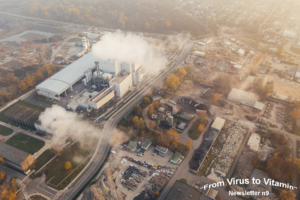OF Discussion Board n°9 – 23 October 2020
 Question asked : « Should the present crisis be used by policy makers as an opportunity to leverage and accelerate the sustainability and climate change agenda even if it could imply a kind of national « industrial policy » with its potentially distorting effects on national and international market game? If yes, how governments should strike the balance between the aspiration of « back to normal » and the needs of accelerating structural adjustment for climate changes? »
Question asked : « Should the present crisis be used by policy makers as an opportunity to leverage and accelerate the sustainability and climate change agenda even if it could imply a kind of national « industrial policy » with its potentially distorting effects on national and international market game? If yes, how governments should strike the balance between the aspiration of « back to normal » and the needs of accelerating structural adjustment for climate changes? »
Thanks for those of our contributors who ventured to react to the this question posed in this Discussion Board.
Editorial – Scaling up industrial policy at regional level
by Virgile Perret & Paul H. Dembinski
The Covid-19 pandemic has revealed the structural weaknesses of our global economic system while revamping attention on the need for state intervention. As production dynamics in every country has been severely affected, industrial policy has been considered as one of the pillars of the recovery strategies. While some plead for a return to the pre-crisis “normal” as quickly as possible, others view the crisis as an opportunity to reshape our industrial policy along a new sustainable path.
The need to adopt a “fresh approach to industrial policy that will put the economy on a dynamic growth agenda supporting effectiveness, growth and jobs, and enabling transition to a low-carbon and resource-efficient economy” is widely accepted. But it is more difficult to reach an agreement on the means required to achieve that end.
To tackle climate change, it may be necessary to “change the game’s global rules”, “question existing globalization” and adopt “policies at supranational level” such as a Green New Deal in Europe. In other words, a national industrial policy may be ineffective. Instead, a “regional industrial policy” could be better adjusted to the task as it would “bring together countries subject to the same monetary and social regulations.” For a new regional industrial policy to succeed, it is indeed essential that rules on a common level playing field be established. The present crisis thus provides a window of opportunity for reinforced regional integration in Africa, Asia and Latin America, where much remains to be done.
Such proposal also raises the question of the potentially distorting effects of a new industrial policy, the impact of which should be “weighed against local macroeconomic specific situations.” Some show scepticism about the effectiveness of a “too detailed industrial policy” and would rather recommend “a carbon tax to steer economic activity towards less polluting forms and stimulate innovation”. One thing is certain however: social inequalities and environmental imperatives should be tackled together, not separately. If governments neglect the interactions between social justice and environmental sustainability, “recovery from the pandemic could quickly turn into further polarization”.
We may well have reached a turning point on the connection between industrial policy, sustainability and development, highlighting the need to rethink “recourse to novel policy responses requiring thoughtful design but probably in many cases going beyond the scope of normal economics”. This could lead to massive public investment in infrastructures – which amounts to de facto industrial policy -, for example to respond to the needs of “cleaner energy for industry and transport equipment”.
|
  |

| « … fresh approach to industrial policy … ”
Economic insecurity arises from revelation of individuals, communities and countries to adverse events, and their inability to cope with and recover from climate change. Division of labour across globe is escalating and concepts of national industries with little interaction rest of the world are becoming less relevant. Recent threat to global financial stability has incited endless counterparts with the impact of natural disasters. Climate change and the damage to economic livelihoods caused by natural disasters, whether droughts or floods, are glaring notices of threat to sustainability. Fresh approach to industrial policy that will put the economy on a dynamic growth agenda supporting effectiveness, growth and jobs, and enabling transition to a low-carbon and resource-efficient economy is need of the hour.
Archana Sinha
|
 |
| « … a regional industrial policy would be better … ”
National industrial policy is not the only option. A regional industrial policy would be better – bringing together countries subject to the same monetary and social regulations. This calls into question the technocratic conception of globalization defended by the GATT and then by the WTO. This conception produced disastrous ecological, economic and social effects, effects predicted by theory according to the analyses of Maurice Allais (Nobel Prize winner in economics). These effects would be less if the principles of free trade were managed in homogeneous regional spaces subject to the same monetary and social regulations. For a new industrial policy, the current crisis – without being its condition – can serve as a pretext.
Etienne Perrot
|
 |
| « … a need to change the game’s global rules …”
The climate change agenda needs to be assumed and the world fossil fuel-based productive structure reconsidered.There is a need to change the game’s global rules as US-led protectionism, generated by their productivity problem, questions existing globalization, mainly in food and energy production. Less fragile shorter value chains are needed. The new normal includes cleaner energy for industry and transport equipment. New forms of work at home mean less travel and pollution. More energy is required, and the new clean energy infrastructure and dynamics will lead to the next economic cycle.
Oscar Ugarteche
|
 |
| « … policies at supranational level …”
Tackling climate change requires policies at supranational level, as is clearly understood by EU leadership. Markets still misprice climate risks and overestimate returns of carbon-intensive assets. The Next Generation EU recovery fund is clearly oriented to contribute correcting such market failure. Its strength is that it aims at funding fully operational, highly productive industrial or modernization projects, not inefficient existing situations. Banks and the ECB are also reviewing lending rules for “green” projects, and the equity markets are positive on such innovative companies. These developments are fully compatible with highly competitive open markets, provided rules on level playing field are established. The problem lies with politicians: will they set up sufficiently independent, objective ways of evaluating projects?
Domingo Sugranyes
|
 |
| « … re-balance educational competencies spatial distribution …”
Industrial policy potentially distorting effects must be weighed against local macroeconomic specific situations. Is always justified when striking attempt to re-balance educational competencies spatial distribution with economic spatial distribution. Today 1.3 billion people have competencies that either exceed or are insufficient for the activities they perform. Most of the problem lying on demand for professional skills not met by supply from areas having it in excess. Evidence suggests in fact that most industries emerge in regions where related industries were already present (Boschma, Minondo, and Navarro 2013) not where young well-trained people are. Industrial policy is also justified whenever social capital in the region or nation hampers local creation of new industries by enforcing a normative structure meant to discourage new entrepreneurship, since this might alter balance of power.
Eutimio Tiliacos
|
 |
| « … a meaningful carbon tax is needed …”
A meaningful carbon tax is needed to steer economic activity towards less polluting forms and stimulate innovation. This carbon tax could be combined with redistribution tools aimed at households with low income and periphery regions. I am sceptical of an industrial policy that would go in too much detail, as the record for this policy tool is not good. I much prefer a clear Pigouvian tax, and then let firms and households change their behaviour accordingly.
Cédric Tille
|
 |
| « … social and environmental inequalities should not be tackled separately …”
Recently the current US President referred to fracking as a “big deal”, and opposing it as being out of touch with working-class Americans. Other policy-makers elsewhere, in both high-income economies, affected by rising social inequalities, and developing economies, engaged in filling the gap with the latter, may follow Trump’s example. Defined by Piketty as the most pressing issues of our time, social and environmental inequalities should not be tackled separately: in the COVID-19 recovery those instances risk to be in conflict as ever before! Instead of a unique opportunity for governments worldwide to experiment bold industrial policies, informed by environmental considerations, recovery from the pandemic could quickly turn into further polarization, neglecting the interactions existing between social justice and environmental sustainability.
Valerio Bruno
|
 |
| « … beyond the scope of normal economics …”
Measures which target adaptation and mitigation in response to climate change and environmental crisis surely have absolute priority. Some of these policies such as realistic carbon pricing fit easily into standard economic thinking. Others such as industrial policies adopted as part of Green New Deals less so. If one looks back at the first twenty years of the new millennium it is anyway not clear of what normality might consist, and thus how one would return to it. The present climate and environmental crisis – for which there are no historical precedents as to many of its features and its extent – unsurprisingly requires recourse to novel policy responses requiring thoughtful design but probably in many cases going beyond the scope of “normal economics”.
Andrew Cornford
|
 |
| “… the State should provide the guidelines and the objectives …”
My guess is that the agenda you mentioned should imply an industrial policy in the sense that the State should provide the guidelines and the objectives it wants to achieve. However, the achievement of those goals cannot be pursued without the sustain of the private sector. In this sense, I very much welcome any effort that the business and corporate sectors will do in order to contribute to a more sustainable world, where sustainable stands for economic, environmental, social and human sustainability. The role of the State should be to encourage investments and operations that nudge corporations moving towards that direction.
Andrea Roncella
|
 |
 Question asked : « Should the present crisis be used by policy makers as an opportunity to leverage and accelerate the sustainability and climate change agenda even if it could imply a kind of national « industrial policy » with its potentially distorting effects on national and international market game? If yes, how governments should strike the balance between the aspiration of « back to normal » and the needs of accelerating structural adjustment for climate changes? »
Question asked : « Should the present crisis be used by policy makers as an opportunity to leverage and accelerate the sustainability and climate change agenda even if it could imply a kind of national « industrial policy » with its potentially distorting effects on national and international market game? If yes, how governments should strike the balance between the aspiration of « back to normal » and the needs of accelerating structural adjustment for climate changes? »











